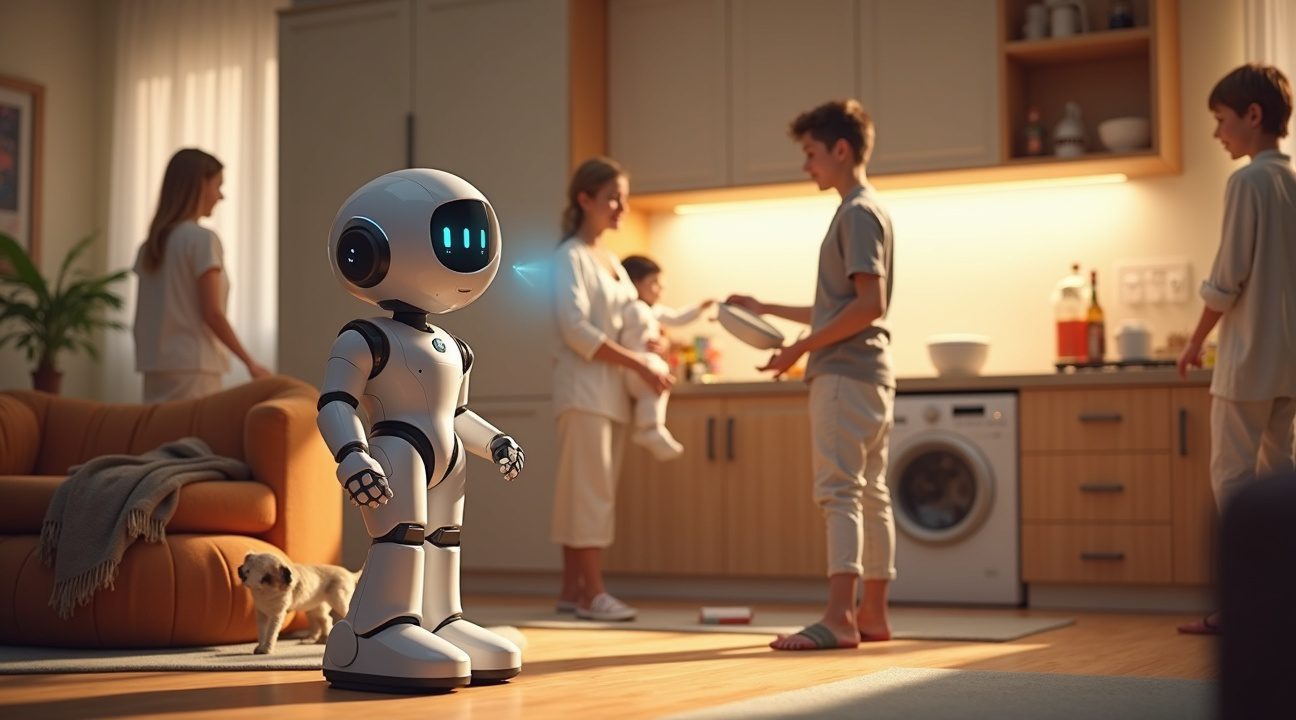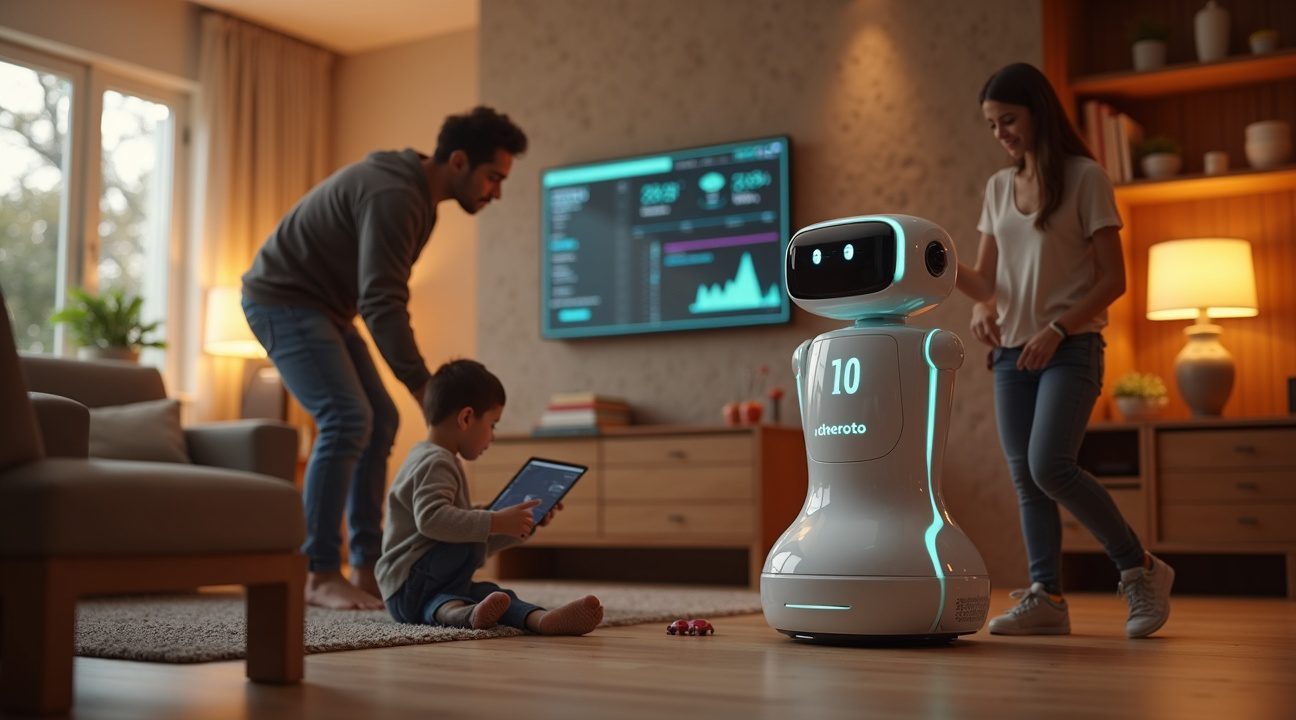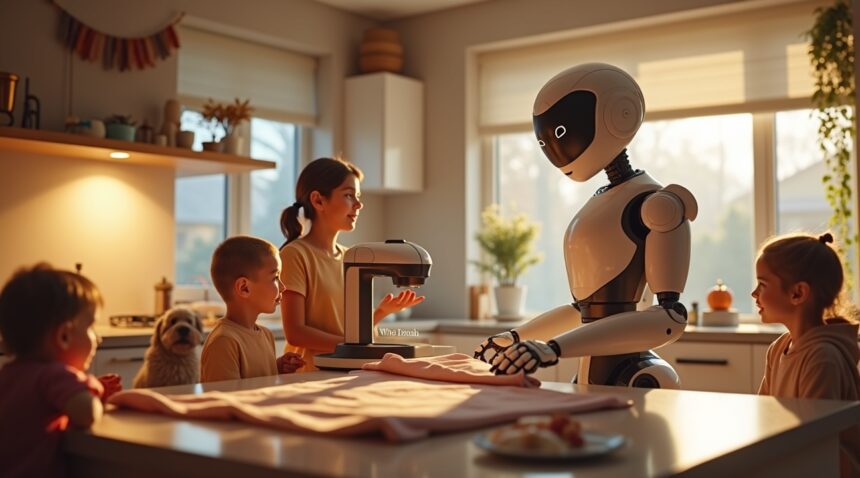Sunday Robotics has introduced Memo, a revolutionary humanoid robot uniquely trained on 10 million real household chores sourced from hundreds of real families, setting it apart from conventional lab-developed robots.
Key Takeaways
- Memo was trained using real-world data captured by Sunday Robotics’ proprietary Skill Capture Glove from hundreds of families performing authentic household tasks.
- The robot executes complex chores such as folding laundry, loading dishwashers, clearing tables, organizing shoes, and even preparing espresso — all tailored to individual household habits.
- Sunday Robotics is launching a Founding Family Beta program in November 2025, which will involve 50 selected households receiving uniquely numbered Memo units for in-home testing and feedback collection.
- Memo enters a competitive market alongside established humanoid robots like NEO from 1X Technologies and Figure 03 developed by Figure AI, but stands out by prioritizing family safety and a rich dataset of diverse household scenarios.
- The robot may save users up to a full year of life usually spent performing household chores, and industry analysts forecast mainstream adoption of humanoid home assistants within the next ten years.
Memo Robot Masters 10 Million Real Household Chores Before Public Debut
Sunday Robotics has introduced Memo, a humanoid robot that stands apart from conventional household assistants through its extensive real-world training foundation. I’ve observed how this robot represents a fundamental shift in domestic robotics development, having learned from approximately 10 million authentic household tasks collected from hundreds of actual families rather than sterile laboratory conditions.
Real-World Training Creates Practical Mastery
The robot demonstrates proficiency in complex, time-intensive household activities that typically challenge automated systems. Memo’s capabilities include several demanding tasks:
- Folding laundry with attention to fabric types and garment specifications
- Loading and unloading dishwashers while managing delicate items and spatial constraints
- Clearing dining tables efficiently without disrupting remaining place settings
- Organizing shoes according to household preferences and available storage
- Preparing espresso with consistent quality and presentation
Sunday Robotics achieved this comprehensive skill set through their proprietary Skill Capture Glove technology, which recorded thousands of hours of genuine task performance data. This approach differs significantly from traditional robotics development methods that rely on controlled environments or industrial platform adaptations.
Most household robots currently available struggle with the unpredictable nature of real homes, where clutter, varying lighting conditions, and irregular layouts create constant challenges. Memo’s training in authentic domestic settings addresses these limitations directly, providing the robot with experience handling messy, unpredictable environments that mirror actual living spaces.
The training methodology represents a significant advancement in artificial intelligence application for domestic use. Rather than programming rigid task sequences, Sunday Robotics allowed Memo to learn from natural human movement patterns and decision-making processes observed across diverse households.
This real-world foundation gives Memo distinct advantages in adaptive utility compared to competitors. The robot can adjust its approach based on environmental variations, household layouts, and individual family preferences without requiring extensive reprogramming or setup modifications. Such flexibility proves essential for practical household integration, where standardized solutions often fall short of meeting diverse family needs.
The company’s emphasis on authentic training data collection positions Memo as a more reliable domestic assistant capable of handling the chaos and variability inherent in family life, making it a potentially valuable addition for households seeking practical automation solutions.
How Memo Adapts to Your Family’s Unique Household Needs
Safety forms the foundation of Memo’s design philosophy, making it a trustworthy addition to any family environment. Engineers built this humanoid assistant with multiple safety protocols that monitor its interactions with children, pets, and delicate household items. The robot’s sensors constantly evaluate its surroundings, ensuring it operates within safe parameters while completing tasks.
Learning and Environmental Adaptation
Memo’s adaptive intelligence sets it apart from conventional cleaning robots. Unlike static devices that follow predetermined paths, this humanoid assistant learns each family’s specific living patterns and preferences. The robot maps room layouts dynamically, adjusting its approach when furniture gets rearranged or when seasonal decorations appear. Families who frequently reorganize their spaces will find Memo seamlessly adapts without requiring manual reprogramming.
The robot’s learning capabilities extend far beyond simple navigation. It observes how family members prefer their belongings organized, which cleaning products they use for different surfaces, and even timing preferences for various household tasks. This personalized approach means Memo won’t interrupt important family moments while still maintaining the home’s cleanliness standards.
Advanced Task Management and Communication
Memo handles diverse responsibilities across multiple rooms, demonstrating capabilities that surpass single-function household devices.
Key functions include:
- Managing kitchen cleanup
- Organizing living spaces
- Sorting laundry
- Tackling unexpected spills and messes
Its versatility eliminates the need for multiple specialized devices, consolidating household automation into one intelligent system.
The communication interface relies on natural language processing, allowing family members to interact with Memo using everyday speech patterns. Children can ask the robot to tidy their playrooms using simple commands, while adults can request complex multi-step cleaning routines. Memo understands context and priority, distinguishing between urgent requests and routine maintenance tasks.
Regular over-the-air updates enhance Memo’s functionality continuously. These improvements expand its task repertoire, refine its safety protocols, and introduce new features based on user feedback and technological advances. Families benefit from an assistant that grows more capable over time without requiring hardware upgrades.
The robot’s contextual decision-making abilities help it navigate complex household situations. When faced with unfamiliar objects or unexpected scenarios, Memo can reason through appropriate responses rather than simply stopping or requesting human intervention. This intelligence, developed through training on millions of household scenarios, enables the robot to maintain productivity while learning new tasks through observation and interaction.
Artificial intelligence advances like those powering Memo represent significant progress in making sophisticated automation accessible for everyday households.

Founding Family Beta Program Launches November 2025 with 50 Selected Households
Sunday has announced its Founding Family Beta program will begin on November 19th, 2025, marking a significant milestone for household robotics. The company will select 50 households to receive individually numbered Memo robots, complete with comprehensive support throughout the testing period.
Real-World Testing and Product Refinement
The beta program serves a critical purpose in the development cycle, allowing Sunday to gather authentic user feedback from actual home environments. This approach differs from traditional laboratory testing, as participants will use Memo robots in their daily routines, uncovering challenges and opportunities that controlled environments simply can’t replicate.
Beta families will contribute to several key areas of development:
- Safety protocol improvements based on real household scenarios
- Feature enhancement through user behavior analysis
- Usability refinements for different family compositions and home layouts
- Performance optimization in diverse living conditions
The feedback collected during this phase will directly influence software updates and hardware adjustments. Sunday’s commitment to full support means families won’t just receive the robots; they’ll have access to technical assistance, regular check-ins, and direct communication channels with the development team.
This beta testing strategy positions Sunday ahead of the broader consumer launch scheduled for late 2026. The extended testing period demonstrates the company’s dedication to delivering a polished product rather than rushing to market. Artificial intelligence development requires this type of careful validation, especially when integrating into personal living spaces.
Memo robots entering homes through this program will compete in an increasingly crowded consumer robotics market. However, Sunday’s advantage lies in its extensive training dataset of 10 million household chores and its integrated AI platform. This foundation provides Memo with capabilities that extend beyond simple task execution to genuine learning and adaptation.
The numbered robots create a sense of exclusivity and careful tracking throughout the beta phase. Each unit becomes part of a controlled study, allowing Sunday to monitor performance patterns and identify areas for improvement. Beta families essentially become partners in the development process, contributing to a product that will eventually reach thousands of households.
The November launch timing aligns strategically with the holiday season, though these beta units won’t be consumer purchases. Instead, they represent Sunday’s investment in real-world validation before the commercial rollout begins in earnest.

Memo Faces Competition from NEO and Figure 03 in Growing Market
Sunday’s Memo enters a fiercely competitive landscape where established players have already carved out significant territory. Artificial intelligence advancements have enabled multiple companies to develop sophisticated household assistants, creating a three-way battle for market dominance.
1X Technologies launched NEO in 2025 with impressive smart home integration capabilities and AI-driven learning systems. The robot adapts to household routines through continuous observation and can integrate seamlessly with existing smart devices. However, NEO’s $20,000 price point places it firmly in the premium market segment, potentially limiting widespread adoption among average families.
Figure AI’s Figure 03 takes a different approach by targeting both residential and industrial applications. This dual-purpose strategy allows Figure AI to leverage economies of scale while developing robust AI performance systems. The company focuses heavily on scalability, positioning Figure 03 as a versatile solution that can transition between different operational environments.
Key Competitive Advantages
Each competitor brings distinct strengths that highlight the diversity within this emerging market:
- NEO excels in custom task adaptation, allowing users to teach new behaviors through direct demonstration
- Figure 03 offers superior processing power for complex multi-step operations
- Memo leverages its 10 million chore training dataset for comprehensive household task execution
- Live learning capabilities in NEO enable real-time improvement based on user feedback
- Figure 03’s industrial heritage provides enhanced durability for demanding household tasks
Sunday strategically positions Memo as the safety-focused alternative in this competitive field. While NEO emphasizes customization and Figure 03 prioritizes performance, Memo’s extensive real-world training creates a foundation built on proven safety protocols. This approach directly addresses parental concerns about introducing robotic assistance into family environments.
The competition intensifies as each company targets slightly different market segments. NEO appeals to tech-savvy early adopters willing to invest in premium home automation. Figure 03 attracts users seeking industrial-grade reliability for demanding household applications. Memo differentiates itself by prioritizing family safety and comprehensive training over cutting-edge features.
Market dynamics suggest room exists for multiple successful platforms, particularly as household robotics adoption accelerates. Each robot’s unique positioning strategy reflects different consumer priorities, from customization flexibility to safety assurance to performance capabilities. Sunday’s emphasis on family-oriented design and safety-first engineering creates a compelling value proposition that distinguishes Memo from its technically impressive but differently focused competitors.
Robot Could Save You One Year of Your Life Spent on Household Chores
The average person spends an entire year of their lifetime completing mundane household tasks. This staggering reality has prompted the development of Memo, a revolutionary humanoid robot designed to reclaim precious hours from daily drudgery.
Surveys reveal that two-thirds of people actively dislike doing chores, creating substantial demand for assistive technologies that can handle these repetitive responsibilities. Memo addresses this widespread frustration by automating the very tasks that consume so much of our daily lives, from washing dishes to folding laundry.
Beyond Traditional Home Automation
Market forecasts indicate rapid expansion in general-purpose home robots, representing a significant shift from single-function devices like Roombas to versatile humanoid assistants. This evolution reflects growing consumer appetite for comprehensive domestic automation solutions. Artificial intelligence advances have made such sophisticated household assistance possible, enabling robots to understand and adapt to varied home environments.
While automation inevitably brings changes to traditional domestic labor structures, Memo prioritizes enhancing quality of life and personal convenience rather than simply replacing human effort. The robot’s extensive training on 10 million chore scenarios enables it to handle diverse household tasks with remarkable adaptability.
Families can redirect their recovered time toward meaningful activities:
- Pursuing hobbies
- Spending quality moments together
- Focusing on professional development
This time liberation represents more than convenience; it offers genuine lifestyle transformation for busy households struggling to balance work, family, and personal responsibilities.
The technology behind Memo demonstrates how smart technology integration can seamlessly blend into daily routines. Unlike earlier robotic attempts that required extensive user training or specific environmental modifications, Memo adapts to existing home layouts and family patterns.
Early adopters report significant stress reduction when routine maintenance tasks disappear from their daily schedules. The psychological benefits extend beyond time savings — households experience improved work-life balance and reduced domestic friction when chore distribution becomes automated rather than negotiated.
Memo’s comprehensive training allows it to handle everything from basic cleaning to complex organizational tasks, positioning it as a true household partner rather than a limited-function appliance. This versatility addresses the primary limitation of previous domestic robots, which could only perform narrow, pre-programmed functions.
The broader implications suggest a fundamental shift in how families approach domestic responsibilities, with technology finally delivering on decades-old promises of truly helpful home automation.
Household Humanoid Robots Expected to Revolutionize Daily Living Within Decade
Household humanoid robots like Memo represent a pivotal shift in how families will manage their daily routines. These advanced machines promise to transform domestic life through continuous learning and adaptation, making them far more capable than traditional automated appliances.
The evolution happens through constant software and data updates that enhance each robot’s functionality over time. I’ve observed how these updates allow robots to develop a deeper understanding of specific home environments, learning everything from preferred cleaning schedules to individual family member habits. Each interaction generates valuable data that improves future performance, creating a personalized experience that grows more sophisticated with use.
Advanced AI Integration Creates Natural Interactions
Large language models and advanced AI reasoning capabilities drive the most impressive aspects of these household assistants. These technologies enable human-robot conversations that feel remarkably natural, allowing family members to communicate requests and receive responses in everyday language. The integration of artificial intelligence creates collaborative task management where robots can understand context, anticipate needs, and adapt their approach based on real-time feedback.
Collaborative tasks become seamless when robots can process complex instructions and respond appropriately to changing circumstances. Rather than following rigid programming, these machines interpret nuanced requests and adjust their methods accordingly. This flexibility proves essential for managing the unpredictable nature of household activities, from cooking assistance to childcare support.
Expert predictions indicate widespread household adoption within 5 to 10 years, driven by rapidly improving technology and decreasing costs. Market analysts expect these robots to become as common as dishwashers or washing machines, fundamentally changing how families approach domestic responsibilities. The transformation extends beyond simple chore automation to comprehensive lifestyle enhancement, where robots anticipate needs and proactively maintain household harmony.
Early adopters already report significant changes in their daily routines, with robots handling everything from laundry folding to meal preparation planning. These machines learn family preferences, dietary restrictions, and scheduling patterns, creating customized approaches that improve over time. The technology’s ability to adapt and evolve means that today’s basic functions will expand into sophisticated household management systems.
The implications extend beyond individual households to broader societal changes in how people spend their time and energy. Families gain precious hours previously dedicated to routine maintenance tasks, allowing more focus on relationships, personal development, and leisure activities. This shift represents a fundamental change in domestic life comparable to the introduction of major household appliances in the 20th century.
Investment in household robotics continues accelerating, with major technology companies developing increasingly sophisticated models. Each generation brings improved motor skills, enhanced reasoning capabilities, and better integration with existing smart home systems. The competition drives rapid innovation, ensuring that capabilities expand while costs decrease for consumers.
Training data from millions of household tasks creates unprecedented learning opportunities for these robots. Unlike traditional appliances with fixed functions, these humanoid assistants continuously refine their skills through accumulated experience across thousands of homes. This collective learning approach means that improvements discovered in one household benefit all users through shared updates.
Safety protocols and reliability measures receive constant refinement as manufacturers prepare for mass market adoption. Rigorous testing ensures these robots can operate safely around children, pets, and valuable household items while maintaining consistent performance standards. The focus on dependability addresses consumer concerns about integrating advanced robotics into personal living spaces.
The convergence of multiple technological advances — from battery efficiency to sensor accuracy — creates the perfect conditions for mainstream household robot adoption. Processing power improvements enable real-time decision-making, while enhanced mobility systems allow smooth navigation through complex home environments. These combined advances position household humanoid robots to become indispensable family members within the current decade.
https://www.youtube.com/watch?v=9hcNj6JdJGk
Sources:
humanoidroboticstechnology.com
Interesting Engineering
GlobeNewswire
IEEE 2024
1X Technologies
The Wall Street Journal
Wins Solutions
Figure AI


